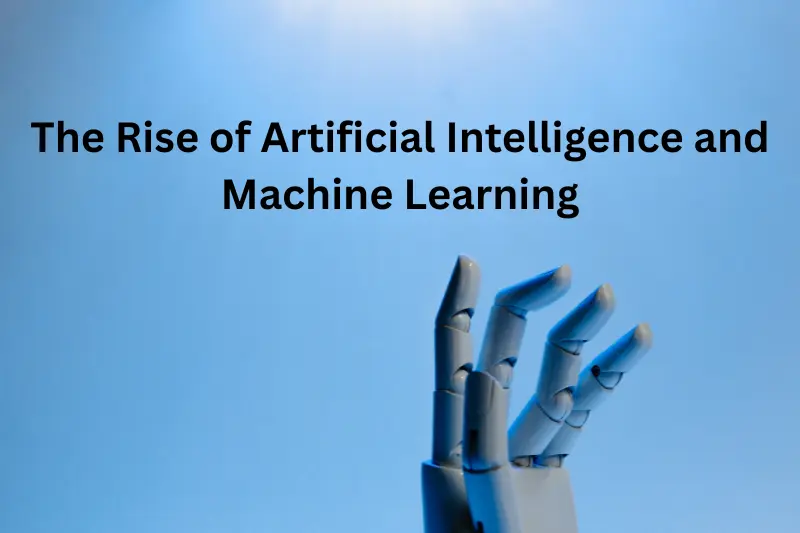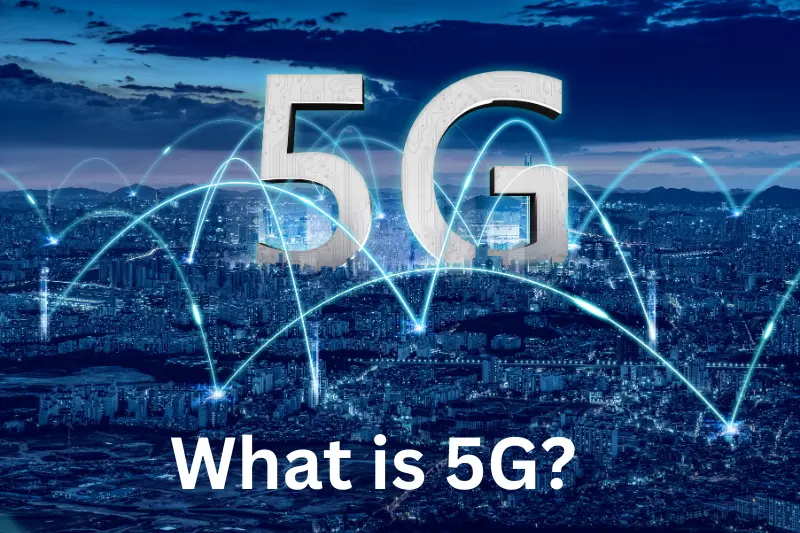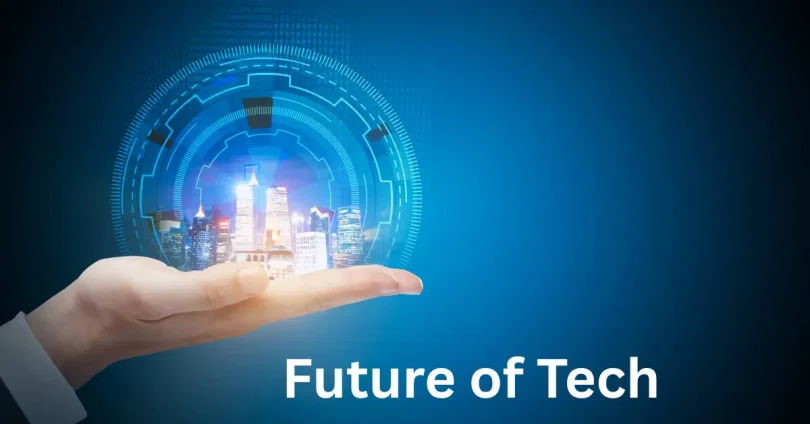The future of tech holds unlimited potential for innovations that will transform how we live, work, and interact with the world. From artificial intelligence to quantum computing, new technologies are emerging at a pace faster than ever before, promising to create smarter, more efficient systems and unlocking opportunities we never thought possible.
In this article, we’ll dive into some of the most exciting developments in the tech world and explore how they will impact industries, businesses, and daily life. Whether you’re a tech enthusiast, entrepreneur, or just someone curious about the next big thing, the future of technology is something you can’t afford to ignore.
1. The Rise of Artificial Intelligence and Machine Learning

What AI and Machine Learning Mean for Our Future
Artificial Intelligence (AI) and Machine Learning (ML) have already begun to make waves across various industries, but their impact will only grow as technology advances. AI refers to the creation of systems that can perform tasks that normally require human intelligence, such as understanding language, recognizing images, or making decisions. Machine learning, a subset of AI, enables systems to learn and improve from experience without being explicitly programmed.
Key Areas AI and ML Will Impact:
- Healthcare: AI-powered diagnostic tools and robotic surgeries will revolutionize how diseases are diagnosed and treated, improving precision and efficiency.
- Finance: Machine learning models are being used for fraud detection, algorithmic trading, and personalized financial services.
- Transportation: Self-driving vehicles, powered by AI, will make travel safer, faster, and more efficient.
- Entertainment: AI-driven recommendations in streaming platforms like Netflix and Spotify are changing how content is consumed, creating highly personalized experiences for users.
The Challenges of AI and Machine Learning
While the benefits of AI and ML are vast, there are challenges to address, such as:
- Ethical concerns: The use of AI in decision-making raises questions about bias, fairness, and accountability.
- Job displacement: Automation could potentially lead to the displacement of jobs, creating a need for retraining and upskilling.
- Data privacy: As AI systems rely heavily on data, ensuring that personal information is protected becomes critical.
2. The Impact of Quantum Computing
What is Quantum Computing?
Quantum computing is poised to be one of the most groundbreaking advancements in technology. Unlike traditional computers, which process information in binary (0s and 1s), quantum computers use quantum bits or qubits. These qubits can exist in multiple states simultaneously, allowing quantum computers to perform complex calculations much faster than classical computers.
How Quantum Computing Will Change the Tech Landscape:
- Data processing: Quantum computing will enable the processing of massive datasets at an unprecedented speed, driving advancements in fields like genomics and climate research.
- Cryptography: Quantum computers could crack current encryption methods, necessitating the development of quantum-resistant cryptography for secure data transmission.
- Artificial Intelligence: Quantum computing can significantly accelerate AI algorithms, opening the door to more advanced machine learning models that can solve problems previously thought unsolvable.
Challenges in Quantum Computing
The development of quantum computers is still in its early stages, with challenges such as:
- Stability: Qubits are highly sensitive to their environment, which makes it difficult to maintain stable quantum states.
- Cost and scalability: Quantum computers are currently expensive to build and operate, and scaling them up to handle large tasks remains a challenge.
- Software: Quantum computing requires new types of software and algorithms that are still in development.
3. The Role of 5G in the Future of Tech
What is 5G?

5G is the fifth generation of mobile network technology, and it promises to deliver faster speeds, lower latency, and more reliable connections than ever before. With 5G, users can expect to download content in seconds, stream high-quality video without buffering, and experience real-time connectivity like never before.
Benefits of 5G:
- Faster speeds: 5G can offer download speeds up to 100 times faster than 4G, enabling smoother experiences for streaming, gaming, and cloud-based applications.
- Lower latency: The reduced delay will benefit applications that require real-time interaction, such as autonomous vehicles and remote surgeries.
- Increased connectivity: 5G will support the growing number of devices connected to the Internet of Things (IoT), from smart homes to connected factories.
5G and Emerging Technologies
The rollout of 5G is not just about faster smartphones. It will also serve as the backbone for innovations in other fields:
- Smart cities: 5G will enable the development of smart infrastructure, such as intelligent traffic systems and energy-efficient buildings.
- Augmented Reality (AR) and Virtual Reality (VR): The high bandwidth and low latency of 5G will power immersive AR and VR experiences in gaming, education, and remote work.
- Healthcare: Real-time remote monitoring and telemedicine will become more viable with the ultra-low latency of 5G networks.
Ready to stop wondering and start knowing? Let’s dive in.
Master Aerial Photography Tips for Stunning Images
Drone Reviews and Comparisons: Discover the Best Drones now
Powerful Feature Stories and Spotlights That Inspire
Behind the Scenes of Popular Tech: Secrets Exposed
4. The Growing Importance of Cybersecurity
Why Cybersecurity is Crucial in the Future of Tech
As technology becomes more integrated into our daily lives, cybersecurity has never been more important. The increasing reliance on digital platforms for everything from banking to personal communication creates vulnerabilities that hackers and cybercriminals are eager to exploit.
Key Areas of Focus in Cybersecurity:
- Data privacy: With more personal information being stored online, protecting user data has become a top priority for businesses and governments alike.
- Cloud security: As more companies move their operations to the cloud, ensuring the security of cloud-based data and applications is critical.
- IoT security: The rise of connected devices means there are more potential entry points for cyberattacks. Securing IoT devices is a growing concern.
Innovations in Cybersecurity
- AI and machine learning: These technologies are being used to detect and respond to cyber threats in real-time, improving the ability to prevent attacks.
- Blockchain: Blockchain technology can provide decentralized and secure systems for transactions, reducing the risk of fraud and data manipulation.
- Biometric authentication: Facial recognition and fingerprint scanning are becoming increasingly popular as secure alternatives to traditional passwords.
5. The Evolution of the Internet of Things (IoT)
What is the Internet of Things (IoT)?
The Internet of Things (IoT) refers to the network of interconnected devices that communicate with each other over the internet. These devices include everything from smartphones and wearables to home appliances and industrial machines.
How IoT Will Shape the Future of Tech:
- Smart homes: IoT enables the development of smart homes, where devices such as thermostats, lights, and security systems can be controlled remotely for increased convenience and energy efficiency.
- Industrial IoT (IIoT): In industries like manufacturing, IoT sensors can monitor equipment performance, reduce downtime, and optimize supply chains.
- Healthcare: IoT devices are already being used for remote patient monitoring, wearable health trackers, and connected medical devices, making healthcare more personalized and efficient.
Challenges in IoT Development
While IoT offers tremendous potential, there are challenges to overcome:
- Interoperability: Different devices and platforms must be able to communicate effectively with each other.
- Security: With so many devices connected to the internet, ensuring the security of each one is crucial to prevent data breaches and hacks.
- Data overload: IoT devices generate vast amounts of data, which can be overwhelming to manage and analyze without proper infrastructure.
6. The Future of Wearable Technology
What is Wearable Technology?
Wearable tech refers to electronic devices that can be worn on the body, such as smartwatches, fitness trackers, and even smart clothing. These devices are designed to integrate seamlessly into our daily lives and provide real-time data and notifications.
The Future of Wearable Tech:
- Health and fitness: Wearables will continue to evolve, offering advanced features like continuous health monitoring, real-time vitals tracking, and even non-invasive blood sugar testing.
- Augmented reality: Some wearable devices will incorporate AR to enhance user experiences, such as providing directions or displaying virtual information in real-time.
- Fashion and functionality: The design of wearables will continue to improve, blending fashion with technology for devices that are not only functional but also stylish.
Challenges of Wearable Technology
- Battery life: One of the biggest challenges for wearable tech is ensuring that devices have long-lasting battery life while maintaining performance.
- Privacy: As wearables collect sensitive personal data, ensuring that this information is protected is crucial for consumer trust.
- User adoption: Despite their growing popularity, wearables still face challenges in widespread adoption, particularly in areas like healthcare and fashion.
Conclusion
The future of tech is bright and full of possibilities, with advancements across every sector offering the potential to improve our lives in countless ways. From AI and quantum computing to the Internet of Things and wearable tech, the innovations on the horizon are set to redefine the way we interact with the world. As we move forward, it’s essential to stay informed and adaptable, embracing the technologies that will shape tomorrow. The future of tech is not just something to look forward to—it’s something we’re already living in.
FAQs
What is the future of AI and Machine Learning?
AI and Machine Learning will continue to evolve, impacting various industries like healthcare, finance, and transportation. These technologies will improve efficiency, enhance personalization, and automate many tasks.
How will quantum computing change technology?
Quantum computing will revolutionize data processing, making it possible to solve complex problems much faster than traditional computers. It will drive advancements in AI, cryptography, and scientific research.
How will 5G improve everyday life?
5G will provide faster internet speeds, lower latency, and more reliable connections, leading to better streaming, improved gaming experiences, and the growth of smart cities and autonomous vehicles.
What role does cybersecurity play in the future of tech?
As technology advances, cybersecurity becomes more crucial. With the increasing use of digital platforms, protecting user data and preventing cyberattacks will be essential to ensure the safety and privacy of individuals and businesses.
What are the benefits of wearable technology in the future?
Wearable technology will offer real-time health monitoring, improve fitness tracking, and even integrate augmented reality. These devices will be more functional, personalized, and seamlessly integrated into our daily lives.




